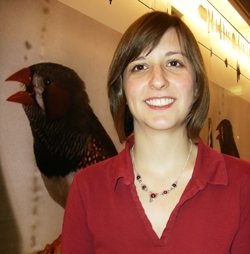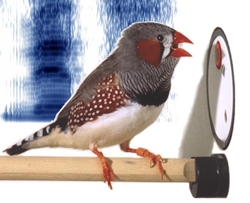
Zebra finches discriminate wit from wet
Can Zebra finches learn to distinguish two very similar Dutch words? Research by behavioral biologist Verena Ohms proved that they can identify 'wit' and 'wet'. Ohms published her findings in "Proceedings of the Royal Society B '.

In a recent study behavioural biologist Verena Ohms and her colleagues from the Institute of Biology Leiden and the Max-Planck-Institute in Seewiesen, Germany, have addressed the question whether zebra finches can learn to discriminate between two very similar words (wit and wet) and afterwards transfer this discrimination to voices they have never heard before. The results of this experiment, recently published in Proceedings of the Royal Society B, show that the birds indeed are able to classify the two words correctly even when presented with unfamiliar voices, including those of the other sex.
Evolution of human speech
This exciting finding has an impact on discussions about the evolution of human speech. When people are listening to what somebody is saying, they can understand the words a person is speaking independent of the identity of the speaker. It does not matter whether the presenter of the daily evening news is a man or a woman, neither does it matter whether he or she is 30 or 70 years old- we still understand what is being said. Although there are large differences between and even within individual voices, we are capable of recognizing the same words spoken by different speakers. This is self-evident for us and yet one of the fundamental characteristics of human speech perception and absolutely crucial for communicating with each other. The reason why we can identify the same words produced by different speakers is because we form categories of distinct speech sounds with vowels being the most prominent sounds.
The perception of phonetic categories
It has been thought for a long time that this categorization of speech sounds is special and unique to humans. However, studies on speech perception by animals have suggested that this view is wrong and therefore raised a vigorous discussion among researchers from various disciplines such as biology, linguistics and psychology. Usually these studies tested the ability of animals to discriminate between isolated, and most of the time artificial, vowels. Although such experiments already indicated that animals are able to discriminate between different speech sounds, they were highly controversial since many people argued that discriminating between isolated sounds is not comparable to what humans do when listening to each other.
More critical test

We have to extract relevant differences between words and voices while at the same time ignoring irrelevant variation. Therefore the current study is a more critical test of the ability of animals to form phonetic categories. Additionally, the zebra finch is a non-related species which makes the result even more striking. This indicates that either this ability did not emerge on a recent evolutionary scale, or that is may arise quite readily and is not a highly sophisticated trait. Summarizing it seems likely that human speech exploited pre-existing perceptual mechanisms and that these mechanisms did not evolve specifically for speech, but might fulfill a more general purpose.
Behavioural Biology
This research group brings together the study of proximate mechanisms (development and learning processes) with that of ultimate processes (adaptation and evolution). They generate and explore novel ideas about the evolution of behaviour and about the role of behaviour in evolutionary processes. Acoustic and visual signals, in particular those of birds and fish, but also humans and other animals, are important model systems in their research. They cover a wide range of subdisciplines: from biolinguistics and animal cognition to animal ecology and conservation. They also study the impact of environmental sound from natural and anthropogenic sources on animal signals and well-being.
Brief biography Verena Ohms
Verena is now working on her PhD project on the production and perception of formants in bird vocalizations.
In 2007 she graduated in Biology on comparative investigations on functional neuroanatomy in different breeds of domestic duck (Anas platyrhynchos f.d.) at the Heinrich-Heine-Universitaet Duesseldorf in Germany. During her studies she developed a very strong interest in Behavioural Biology and interdisciplinary research.
